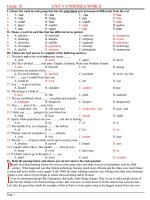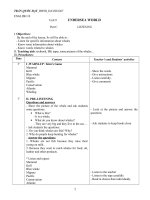unit 19 undersea world listening
Bạn đang xem bản rút gọn của tài liệu. Xem và tải ngay bản đầy đủ của tài liệu tại đây (110.49 KB, 3 trang )
TRẦN QUỐC ĐẠT_DH9D_DAV081267
ENGLISH 10
Unit 9 UNDERSEA WORLD
Part C LISTENING
I. Objectives:
By the end of the lesson, Ss will be able to :
- Listen for specific information about whales
- Know some information about whales
- Know words related to whales
II. Teaching aids: textbook, BB, tapes, some pictures of the whales…
III. Procedures:
Time
Content Teacher’s and Students’ activities
3’
7’
I .WARM-UP : Kim’s Game
Mammal
Krill
Blue whale
Migrate
Pacific
Conservation
Atlantic
Whaling
II. PRE-LISTENING
Questions and answers
- Show the picture of the whale and ask students
some questions:
• What is this?
- It is a whale.
• What do you know about whales?
- They are very big and they live in the sea…
- Ask students the questions:
1. Do you think whales are fish? Why?
2. Why do people keep hunting for whales?
- Answer the questions:
1. Whales are not fish because they raise their
young on milk.
2. Because they want to catch whales for food, oil,
leather and other products.
* Listen and repeat:
Mammal
Krill
Blue whale
Migrate
Pacific
Conservation
Atlantic
- Show the words
- Give instructions
- Listen carefully.
- Give comments
- Look at the picture and answer the
questions
- Ask students to keep books close
- Listen to the teacher
- Listen to the tape carefully
- Read in chorus then individually
1
TRẦN QUỐC ĐẠT_DH9D_DAV081267
32’
10’
Whaling
III. WHILE-LISTENING
1/ Task 1: Listen to some information about
whales and decide whether the following
statements are true (T) or false(F).
1/ The whale is the third largest animal that has ever
lived on Earth. T/F
2/ Whales are said to be the most intelligent
animals in the ocean. T/F
3/ Some whales are known to move into warm
waters to give birth. T/F
4/ Whales are in danger because of the increase in
population of other sea animals. T/F
5/ Some people are still killing whales for food. T/F
Key:
1.F - 2.T - 3.T - 4.F - 5.T
2/ Task 2:Listen again and then answer the
following questions.
1/ What are the length and weight of the blue
whale?
2/ Why do whales like to feed in the oceans?
3/ According to the listening passage, what are the
good feeding ground for whales?
4/ What is the main reason for the decrease in whale
population?
5/ What have conservation groups asked the
International Whaling Commission to do?
6/ What would happen if we didn’t take any
measures to protect whales?
Key:
1/ The whale grows to 30 meters in length and over
200 tons in weight.
2/ Because there is a lot of krill-their favorite food
in cold waters.
3/ Cold waters in the North and South Atlantic
Ocean and the North and the South Pacific are
their favorite feeding grounds.
4/ Heavy hunting is the main reason for the
decrease in whale population.
5/ They have asked the International Whaling
Commission to stop most whaling.
6/ If we didn’t take any measures to protect whales,
they would disappear forever.
IV. POST-LISTENING
- Introduce the new words
- Turn on the cassette player
- Ask students to read in chorus then
individually
- Read the questions in task 1
independently
- Ask teacher some new words then
take notes
- Listen to the tape carefully and do the
task
- Ask students to read and explain 5
questions in task 1
- Explain some words or phrases which
students cannot understand
- Ask students to listen to the tape twice
and do task 1
- Turn on the tape
- Ask 2 students to give their answers
on the board
- Correct the answers then explain them
- Ask students to read 6 questions in
task
- Explain some new words or difficult
phrases
- Play the tape
- Ask students to listen to the tape again
and answer the questions
- Call 2 students to give their answers
on the board
- Correct the answers
2
TRẦN QUỐC ĐẠT_DH9D_DAV081267
2’
Work in groups: talk about whales, using the
following cues
+ Their length and weight
+ Their feeding grounds and food
+ The reasons for protecting whales
V. HOMEWORK
- Ask students to rewrite the description of the
whale at home
- Ask students to prepare the part Writing (p. 99) at
home.
- Introduce to students how to talk
about whales using the cues
- Talking about the whales
- Let them work in groups
- Ask some students to stand up to talk
about whales
- Listen and correct mistakes
- Give request
- Listen and take notes.
3









